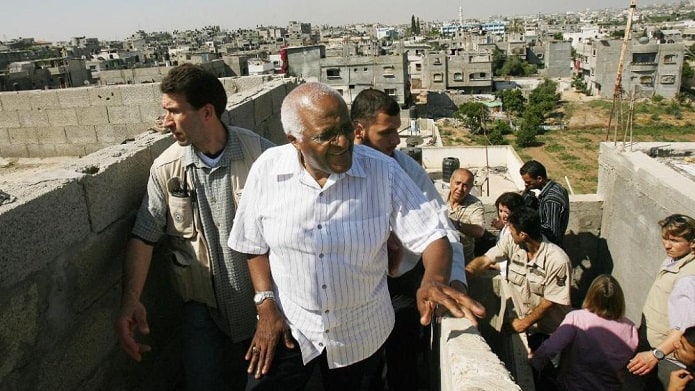Desmond Tutu, who died on Boxing Day, was one of the leading, heroic figures of the movement against white supremacy in South Africa, known as apartheid.
While the leader of the African National Congress, Nelson Mandela, was jailed from 1962 and the leader of the Black Consciousness movement, Steve Biko, was assassinated in 1977, Tutu was able to operate openly in South Africa and overseas, protected to a large degree by his role in the Anglican church.
Tutu raged against oppression everywhere, criticising the Russians for invading Afghanistan, the US for supporting the rebel right-wing Contras group in Nicaragua and Israel for bombing Beirut.
He called for US President George W. Bush and UK Prime Minister Tony Blair to face prosecution at the International Criminal Court over their invasion and occupation of Iraq.
The African Regional Organisation of the International Trade Union Confederation described him as “a gallant soldier who relentlessly fought for social justice, human rights, freedom, peace and security for all”.
Tutu was prepared to take his place on the front line. In 1988, as Archbishop of Cape Town, he led a march to parliament protesting the banning of anti-apartheid organisations that was attacked by police, who turned water cannons on clergy who sat down in the streets.
In 1985, as the first Black bishop of Johannesburg, he publicly endorsed a global economic boycott of South Africa—a policy opposed by many western politicians such as former prime minister John Howard.
His principles and his willingness to fight for them make a mockery of the tributes flowing from world leaders, including Scott Morrison.
Tutu did not, of course, bring down apartheid. The honour for that goes to the Black masses in the townships, the Black youth who boycotted and protested and, above all, to the Black working class who organised and fought back at the heart of South African capitalism—the mines and the factories.
But Tutu was a supporter of the struggle who helped keep the flame of resistance alive even when the apartheid state turned to repression.
Palestine
One aspect of Tutu’s politics that most official “tributes” have avoided mentioning is his support for the Palestinian struggle.
The Electronic Intifada reported how Tutu compared Israel’s rule over Palestinians to apartheid in his homeland.
“I’ve been very deeply distressed in my visit to the Holy Land; it reminded me so much of what happened to us Black people in South Africa,” he wrote in 2002. “I have seen the humiliation of the Palestinians at checkpoints and roadblocks, suffering like us when young white police officers prevented us from moving about.”
“We have visited Israel/Palestine on a number of occasions and every time have been struck by the similarities with the South African apartheid regime,” he wrote in 2011. “The separate roads and areas for Palestinians, the humiliation at roadblocks and checkpoints, the evictions and house demolitions.”
He added that “parts of East Jerusalem resemble what was District Six in Cape Town” – a century-old multiracial community that was destroyed by the apartheid regime in 1966 and declared a whites-only area.
Tutu endorsed the Palestinian call for boycott, divestment and sanctions and supported BDS campaigns around the world.
“Those who continue to do business with Israel, who contribute to a sense of ‘normalcy’ in Israeli society, are doing the people of Israel and Palestine a disservice. They are contributing to the perpetuation of a profoundly unjust status quo,” he wrote.
For taking that principled stand, Tutu, a man who had dedicated his life to fighting racism, was called an antisemite by some.
The Guardian ran an obituary that ignored Tutu’s pro-BDS stance and banned comments that drew attention to this—relenting only after a public campaign of protest.
Festival
The attempt to avoid or decry Tutu’s pro-Palestine and pro-BDS views shows that Israel and its supporters are increasingly on the back foot.
Palestinians and their supporters are now organising a boycott of the Sydney Festival, which opens on 6 January, over a sponsorship by the Israeli embassy.
The Palestinian Justice Movement Sydney says the sponsorship deal was made in May, the same month Israeli armed forces launched air attacks on Gaza, killing Palestinian civilians.
It wrote: “Arts and culture should be a beacon of humanity—not a cover for apartheid, ethnic cleansing and war crimes. Israel is an apartheid state.
“In the year Israel devastated Gaza under bombs, denied COVID vaccines to millions of Palestinians and accelerated its ethnic cleansing in East Jerusalem and the West Bank, the Sydney Festival has decided to accept Israeli sponsorship.”
The PJMS has called on artists to boycott the festival and so far Amy McQuire, a Darumbal and South Sea Islander writer and academic, Blake Prize-winning artist Khaled Sabsabi, Malyangapa and Barkindji rapper Barkaa, South Asian dance company Bindi Bosses, the Arab Theatre Studio, the Bankstown poetry slam, comedian Nazeem Hussain, Wiradjuri installation artist Karla Dickens and intercultural dance group Marrugeku have withdrawn.
Desmond Tutu would approve.
By David Glanz






